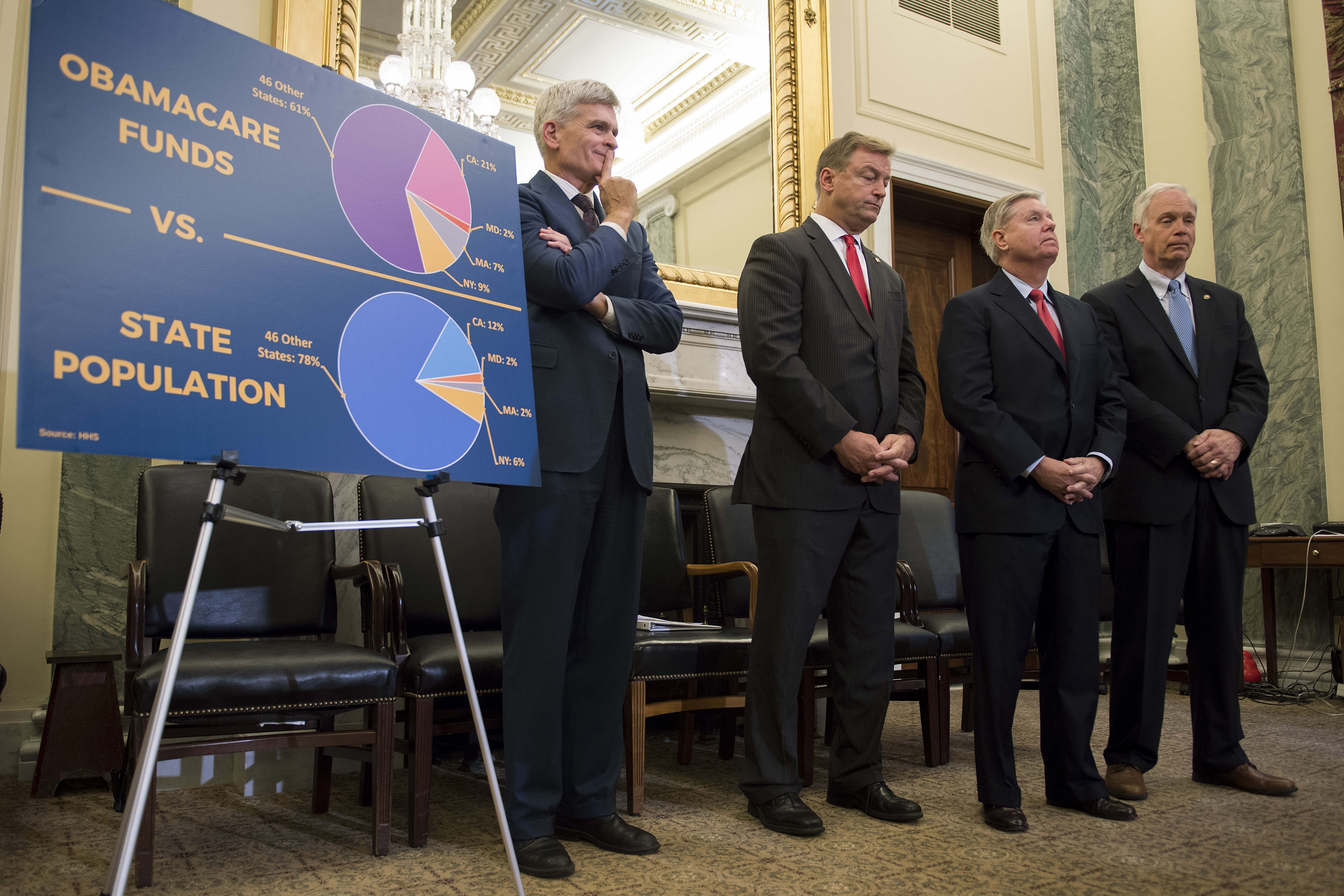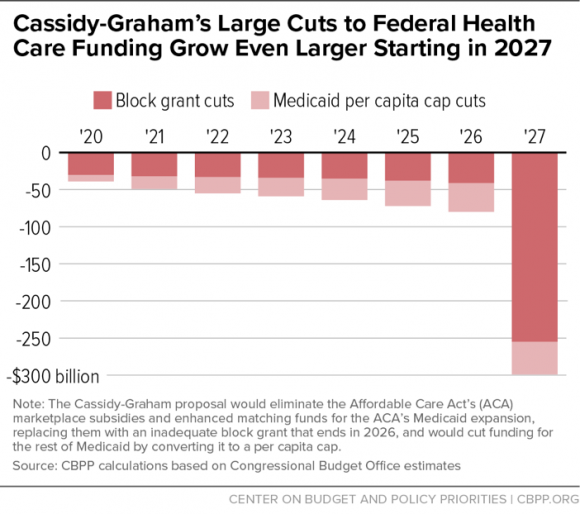The new TrumpCare bill is the worst one yet
Even politically, it makes zero sense


A free daily email with the biggest news stories of the day – and the best features from TheWeek.com
You are now subscribed
Your newsletter sign-up was successful
If you thought TrumpCare was dead, think again. Back in July, the Republicans tried and failed to pass no less than three versions of an ObamaCare repeal bill through the Senate. But Sens. Bill Cassidy (R-La.) and Lindsey Graham (R-S.C.) had already begun work on a fourth version when the third one failed. And in the last week or so, it has picked up a lot of momentum. It might even be able to pass.
This makes zero sense. If anything, the Cassidy-Graham bill is the worst version yet.
To understand why, let's review the two major problems that have plagued every single effort to repeal and replace ObamaCare to date.
The Week
Escape your echo chamber. Get the facts behind the news, plus analysis from multiple perspectives.

Sign up for The Week's Free Newsletters
From our morning news briefing to a weekly Good News Newsletter, get the best of The Week delivered directly to your inbox.
From our morning news briefing to a weekly Good News Newsletter, get the best of The Week delivered directly to your inbox.
The first is policy. Either explicitly or implicitly, Republicans have always promised something better than ObamaCare: lower premiums, lower deductibles, more generous coverage. But Republican ideology also dictates that spending and regulation cuts be used to achieve this result. These are impossible positions to reconcile. Less spending and regulations can only deliver higher premiums, higher deductibles, or less coverage.
The second problem is political. Senate Republicans simply have very few votes to spare. Three defectors have always been enough to kill TrumpCare.
So surely the Cassidy-Graham bill offers up some hitherto unforeseen solution to these problems? Some new policy strategy to bring the moderates onboard, without driving away the hardcore right-wing ideologues? Otherwise, what's the point?
But Cassidy-Graham transparently lacks any such solution. If anything, it makes the contradictions worse.
A free daily email with the biggest news stories of the day – and the best features from TheWeek.com
ObamaCare created a system of subsidies to help people on the state exchanges buy private coverage. It also expanded Medicaid, the government program that covers low-income Americans, in the states that wanted it.
Starting in 2020, Cassidy-Graham would take all that spending and lump it into one big bucket, which it would then distribute to the states — an approach referred to as "block granting." Crucially, the rules for how state governments can spend the block grant money, while loosely tied to health care, are pretty free-wheeling. So ObamaCare's subsidies and Medicaid expansion might be recreated in some states, but not others.
Like previous versions of TrumpCare, Cassidy-Graham would also repeal two key ObamaCare rules: that insurers have to charge the sick and healthy the same premiums, and that they have to offer a standard package of essential benefits.
Graham defends this setup with the logic that state governments, not the federal government, know their residents' needs best. "If you like ObamaCare, you can reimpose the mandates at the state level," he told CNN. "You can repair ObamaCare if you think it needs to repaired. You can replace it if you think it needs to be replaced."
Except not really.
The amount of money going to the states wouldn't actually keep up with the money ObamaCare would spend on the subsidies and the Medicaid expansion. Instead, a formula would ratchet the money down over time, with the gap growing each year between Cassidy-Graham's spending and what ObamaCare's spending would have been.
And here's the kicker: After 2026, that bucket of money going to the states would disappear completely. From 2027 on, the gap between ObamaCare's spending and Cassidy-Graham's spending (in dark red in the chart below) would leap from a little under $50 billion to $250 billion annually.

So Graham's claim that states can do what they want only kind of holds from 2020 to 2026. After that, how any state is supposed to recreate ObamaCare's coverage is beyond me.
It gets worse.
From 2020 to 2026, Cassidy-Graham wouldn't just give each state money in proportion to what ObamaCare gives them. It would divvy up the pot based on a whole new formula, one that accounts for density, poverty, and several other things. The practical result is that liberal-leaning states that took advantage of ObamaCare's Medicaid expansion would lose tons of money while conservative-leaning states that didn't expand Medicaid, even though it was offered to them, would get a lot more money.
Set aside, for a moment, the ugly moral implications of this system. It's also completely bizarre politics.
All the moderate GOP senators whom Cassidy and Graham are ostensibly trying to woo come from states that would get screwed by their bill. Republican Sens. Lisa Murkowski of Alaska and Susan Collins of Maine have been the two stalwart "no" votes to date. Alaska and Maine, respectively, would lose $255 million and $115 million annually by 2026. Republican Sen. John McCain of Arizona, another crucial "no" vote from the last go-around, would see his state lose $1.6 billion a year by 2026. The list goes on.
Oh, and adding insult to injury, Cassidy-Graham would cut the federal contribution to Medicaid as it existed before ObamaCare as well. (The light red bars in the chart above.) Starting in 2020, the gap between Medicaid spending under Cassidy-Graham and current law would grow. And, like the Senate's previous TrumpCare bill, the speed of the gap's growth would actually increase after 2026.
To review: Cassidy-Graham spends 2020 to 2026 screwing over moderate states. Then it yanks the rug out from under all states. Meanwhile, it significantly cuts the government health coverage for the poor that existed before ObamaCare.
As the left-leaning Center on Budget and Policy Priorities put it, "beginning in 2027, Cassidy-Graham would be virtually identical to a repeal-without-replace bill — except for its additional Medicaid cuts."
I suppose it could still pass. Maybe the drama of a Sept. 30 deadline, plus the overwhelming pressure to live up to seven years of promises to somehow kill ObamaCare, will convince enough Republican senators to hold the line. For reasons that defy explanation, Arizona Gov. Doug Ducey (R) supports the bill, which could give McCain cover. Maybe Sen. Rand Paul (R-Ky.), who currently opposes Cassidy-Graham for not being right wing enough, will wake up in a cordial mood on the day of the vote. Maybe the formulas are so confusing that some senators just won't realize what they're voting for.
But I'm completely flummoxed as to how this bill is supposed to attract GOP moderates on the merits. If Cassidy-Graham passes, it won't be thanks to a better design than other TrumpCare bills. It will be thanks to blind luck or nonsensical politics — or both.
Jeff Spross was the economics and business correspondent at TheWeek.com. He was previously a reporter at ThinkProgress.
